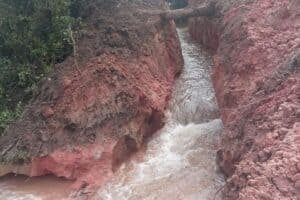DWS committed to helping KwaZulu-Natal municipalities provide clean water and sanitation services to citizens as required by the constitution.

The Department of Water and Sanitation (DWS) has kicked into high gear to provide essential assistance to municipalities grappling with water-related issues in KwaZulu-Natal.
This decisive action follows the release of the final report and recommendations by the South African Human Rights Commission (SAHRC), which conducted an in-depth investigation into the water challenges plaguing the province.
Three pivotal reports, namely the Blue, Green, and No-Drop reports, released in June 2023, have shed light on the deteriorating state of water and sanitation services in many KwaZulu-Natal municipalities.
Acknowledging the gravity of the situation, the DWS in response pledged a commitment to support municipalities in KwaZulu-Natal to fulfil their constitutional mandate of providing citizens with access to clean water and sanitation services.
Municipal drinking water quality
The DWS has emphasized the significance of three pivotal reports, namely the Blue, Green, and No-Drop reports, released in June 2023.
“These reports serve as crucial regulatory and support mechanisms designed to enhance municipal drinking water quality, wastewater management, and water conservation and demand management,” the DWS said.
In an official statement released on Friday, the DWS expressed its appreciation for the SAHRC’s report and its alignment with the department’s own findings. The DWS also acknowledged the daunting task ahead, which involves improving wastewater management, restoring water quality, and ensuring the reliability of water supply.
ALSO READ: Tshwane’s woes deepen: Every drop of water counts
“These goals will necessitate increased investments, financial sustainability, and the cultivation of a skilled and professional workforce,” the DWS said.
To address these challenges comprehensively, the DWS has initiated a series of vital steps.
The department has allocated approximately R7.8 billion to fund numerous critical water infrastructure projects.
Among these projects, the uMngeni-uThukela Water Board, a water entity under the DWS, has been allocated nearly R2.3 billion for various initiatives, including the Greater Mpofana Bulk Water Supply Project in uMgungundlovu District, the Maphumulo Bulk Water Supply Project in iLembe District, the UMshwathi Bulk Water Supply Project serving both uMgungundlovu and iLembe Districts, and the Lower uMkhomazi Bulk Water Supply Project in eThekwini.
Bulk Regional Water Scheme
One standout initiative is the Bulk Regional Water Scheme for Alfred Duma Local Municipality in uThukela District Municipality, with an estimated cost of R5 billion.
Earlier this year, Minister Mchunu inaugurated the completed Spring Grove Water Treatment Plant in Rosetta and the Bruntville Reservoir in Mooi River, both located in the uMgungundlovu District.
This ambitious project represents one of the most significant rural-based endeavours in recent years and aims to provide safe drinking water to Mpofana and uMngeni Local Municipalities.
READ MORE: Signs of recovery: Reservoirs gradually filling up – Rand Water
In response to the water challenges facing the uMkhanyakude District Municipality, the Minister invoked Section 63 of the Water Services Act.
This intervention involves providing substantial support and guidance to the municipality to enhance the management, operation, and maintenance of water and sanitation infrastructure.
Among the high-value water projects in the uMkhanyakude District are the Greater Ingwavuma Bulk Water Supply Scheme in Jozini Local Municipality and the Mtikini Water Supply Scheme in Umhlabuyalingana Local Municipality, both geared towards supplying safe drinking water to various communities.
Overstrained infrastructure
The Ugu District Municipality has also grappled with water and sanitation service delivery issues, primarily stemming from ageing and overstrained infrastructure, surging demand, illegal connections, and vandalism.
To tackle these immediate concerns, the department has allocated R150 million from the Water Services Infrastructure Grant (WSIG) to the district.
In addition to these crucial actions, the DWS has embarked on several other key initiatives.
These include establishing a water partnerships office within the Development Bank of Southern Africa to facilitate strategic collaborations with the private sector for investments in water infrastructure.
READ MORE: Limpopo village still without water, after year of protests
The department is also working on the reconfiguration of water boards to provide enhanced support to under-capacitated Water Services Authorities (WSAs).
Furthermore, the newly established uPongola-Mzimkulu Catchment Management Agency (CMA) has been entrusted with the vital responsibility of decentralized water resource management and the protection of rivers throughout KwaZulu-Natal.
Recognizing the need for legislative reform, the department is in the process of amending the Water Services Act.
These amendments aim to clarify the roles of municipalities as Water Services Authorities, ensuring that Water Service Providers adhere to minimum norms and standards.
Moreover, these amendments will grant the national department greater authority to intervene effectively as a last resort when municipalities fail to address deficiencies in water and sanitation services.






